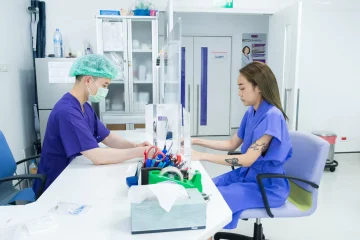Hemorrhoids are a common condition that many people deal with, yet they often remain a topic shrouded in silence. In this detailed guide, we’ll explore what hemorrhoids are, why they bleed, and the various treatments available, ranging from home remedies to medical procedures. This article also includes valuable insights into the symptoms and a comprehensive summary of everything discussed.
What are hemorrhoids, and why do they bleed?
What are Hemorrhoids, and Why Do They Bleed?
Hemorrhoids, often known as piles, are swollen veins in the lowest part of your rectum and anus. Similar to varicose veins, they can develop under the skin around the anus (external hemorrhoids) or inside the rectum (internal hemorrhoids).
Causes of Bleeding Hemorrhoids
The primary reason hemorrhoids bleed is the strain or pressure that causes them to swell. This pressure can stem from chronic constipation, diarrhea, sitting for long periods, or during pregnancy due to the increased pressure on the pelvic veins. The delicate surface of a hemorrhoid can be damaged easily, which leads to bleeding.
Prevention Tips
Preventing hemorrhoids focuses primarily on avoiding the strain that exacerbates the condition. This can include managing your diet to ensure smooth bowel movements, exercising regularly, and avoiding prolonged sitting. Understanding the underlying causes of hemorrhoids is crucial to prevent further complications.
How are bleeding hemorrhoids treated at home?
Home treatments are often sufficient for managing mild to moderate hemorrhoids. These remedies can alleviate symptoms and reduce the risk of recurrent flare-ups.
Dietary Changes
A fiber-rich diet can significantly reduce strain during bowel movements and alleviate the symptoms of hemorrhoids. Foods rich in fiber like fruits, vegetables, and whole grains can help soften stool and increase its bulk.
Sitz Baths
Sitting in a warm water bath for 10 to 15 minutes two to three times a day can relieve irritation and reduce inflammation. The warmth promotes healing in the affected area.
Medical treatment for bleeding hemorrhoids
When home remedies do not provide sufficient relief, medical treatments may be necessary. These are designed to reduce the size of hemorrhoids or eliminate them.
Medications
Over-the-counter medications such as hemorrhoid creams or suppositories can be effective in controlling hemorrhoid symptoms. They usually contain ingredients like hydrocortisone that offer short-term relief from pain and swelling.
Minimally Invasive Procedures
For persistent or severe hemorrhoids, procedures like rubber band ligation or sclerotherapy might be recommended. These treatments are generally quick, don’t require anesthesia, and can be performed in a doctor’s office.
External hemorrhoid thrombectomy
If an external hemorrhoid develops a blood clot, a simple procedure called thrombectomy might be necessary.
Procedure Overview
Performed under local anesthesia, this procedure involves making a small cut in the hemorrhoid to drain the clot. It provides immediate relief but is typically reserved for severe cases of thrombosed external hemorrhoids.
Recovery and Care
Post-procedure care is crucial for healing and includes using ice packs to reduce swelling and taking pain relievers as prescribed by a healthcare provider. Patients are also advised to follow strict hygiene practices to prevent infection.
Symptoms of Hemorrhoidas
Identifying hemorrhoids early can prevent them from worsening. Common symptoms include:
Signs and Indicators
Patients might notice painless bleeding during bowel movements, discomfort, or itching around the rectal area. Swelling around the anus is also common.
When to Seek Medical Help
It’s important to consult a healthcare provider if there is significant or persistent bleeding or if hemorrhoid symptoms do not improve with home treatment.




